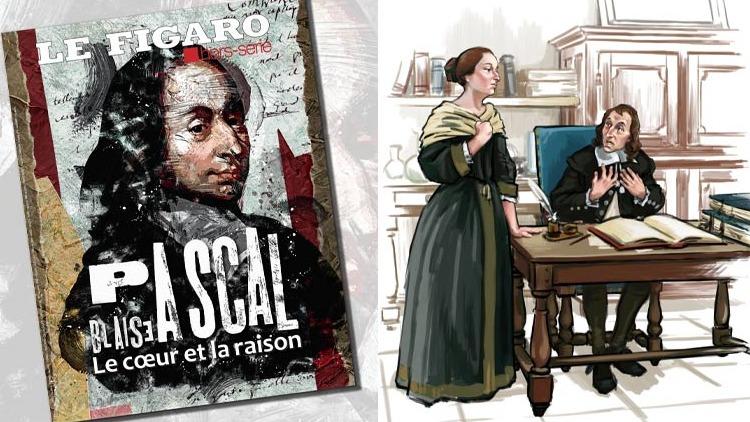This article is taken
from the Figaro Hors-Série Blaise Pascal, the heart and the reason.
She didn't want him to see her go.
The heart of this brother to whom she is so close could have stopped beating to see her cross the threshold of the house which she leaves forever to respond to God's call.
For four years she has been making Him wait, four years that she has been postponing the resolution of this great desire, in order to obey her father.
Étienne may have been converted, having embraced the life of faith with a whole new fervor, but he couldn't stand the idea of his youngest child being taken from him.
Faced with Jacqueline's desire to enter religion, Gilberte said of her father that "
he was strangely torn
".
On the one hand, he was glad to see his children sharing his renewed faith, on the other, he couldn't conceive of separating from her forever,
Jacqueline must therefore have secretly seen M. Singlin, spiritual director of the nuns and the Solitaires, whose sermons she had followed assiduously until then, in the company of Blaise.
His grave and simple words had touched their hearts.
God had not spared his own son to save men, he ardently desired their love.
“
I have come to cast fire into the earth;
and what do I want, if not for it to light up?
(Luke 12:49).
Read alsoThe editorial of Le Figaro Hors-Série: Blaise Pascal, a man for eternity
In Jacqueline, these words of Christ resounded with such force that nothing, neither social ease, nor the taste for poetry, nor the affection of a father or a brother, could put out the flame.
Also, after Étienne's death and despite Blaise's urgent prayers, Jacqueline left her family, having asked Gilberte to inform him of this the night before.
"
We did not say goodbye, for fear of softening each other, reports her sister, and I turned away from her passage when I saw her ready to go out.
This is how she left the world.
“
Some time later, Jacqueline will however ask her brother, by letter, for his agreement to take the habit: “
Do not take from me what you are not capable of giving me.
(…) You must know and feel my tenderness in some way through yours, (…) don't force me to see you as the obstacle to my happiness
”.
Blaise gave in.
How could this young person, so gifted for the world and so little inclined to matters of religion, which she even saw with a certain contempt, have known such a change of heart?
It all began one morning in January 1646. If the pavement of Rouen had been less frozen that day, the history of the Pascal family and that of universal thought would have been changed.
Because having dislocated his thigh after a fall on the ice, Étienne had needed the help of doctors who had taken up residence to provide him with their care.
For three months, the Deschamps brothers, lords of Landes and La Bouteillerie, had shared the life of the Pascals, talking with them about science, medicine, but also about the subject for which they were burning with ardor: God.
The spirituality of the Abbé de Saint-Cyran, confessor of the
Abbey of Port-Royal, which had had Cornelius Jansenius as a school friend and had discovered Saint Augustine with him, lived there.
Demanding, it advocates the humiliation of man and hope entirely in God.
Little by little, in contact with them, the life of the Pascals had been oriented towards a single goal: to seek the grace of God.
Blaise had joined first.
Then his father, and finally his sisters.
A few months later, in 1647, when he had heard in conference the former Capuchin friar Jacques Forton, known under the name of Friar Saint-Ange, maintain in front of a large audience that he knew all the Christian mysteries by reasoning, that "
faith [was] only as a supplement to minds whose reasoning [was] not vigorous enough, and which [had] not enough light to conceive the said mysteries
», and to call into question the human nature of Christ, the original sin… Pascal was moved by it.
Salvation is serious, engaging business.
Blaise is convinced.
He had gone to find Forton, tried to reason with him, in vain.
When he had learned that the Archbishop of Rouen was preparing to entrust the cure of Crosville to the dubious theologian, he had asked him for an audience and convinced him to demand a retraction.
Willy-nilly, Forton complied.
Blaise Pascal, defender of the faith, was born.
Time, however, had soon seized up this convert's enthusiasm.
Étienne dead, Jacqueline gone, Blaise had confided to his youngest that "
he was in such great abandonment on God's side that he felt no attraction from that side
".
“
Little Pascal
” had redoubled her prayers for this restless heart.
Blaise Pascal, heart and reason,
164 pages, €13.90, available on newsstands and on
Le Figaro Store
.
Cover after the posthumous portrait of Blaise Pascal by François II Quesnel, after 1662 Figaro-Hors-Série

